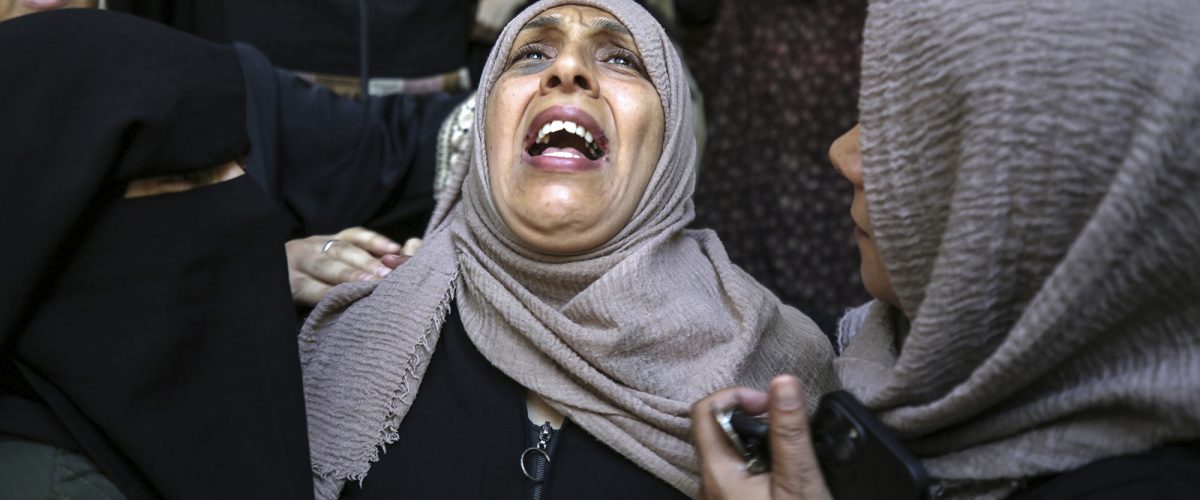As a concerned believer, I am deeply troubled by the recent resolutions of the Southern Baptist Convention against my family, my people and my homeland, Palestine.
Despite professing to uphold Christian values of compassion and justice, the SBC’s approach in this region is deeply flawed and demands urgent reevaluation. Their stance reflects a troubling mix of theological narrowness, political expediency, racial discrimination and dispensational theology.
By prioritizing political alignment with Israel over genuine engagement with Palestinian realities, the SBC overlooks profound moral and ethical concerns. This neglect undermines the teachings of Christ, which call us to stand in solidarity with the oppressed and strive for reconciliation over division.

Jack Nassar
The SBC’s unwavering dismissal of Palestinian claims to self-defense against the Israeli occupation is particularly troubling. This stance fails to acknowledge the harsh realities faced by Palestinians — decades of land confiscations, home demolitions, arbitrary detentions and disproportionate military actions. By denying the legitimacy of Palestinian resistance, the SBC disregards established Christian principles of just war theory and the right to self-determination.
Proponents of the SBC’s stance may cite dispensational theology to justify unwavering support for Israel. However, this theological stance does not absolve the church from grappling with the complex realities on the ground, where Israeli policies often have violated the rights and dignity of Palestinians — fellow children of God deserving of the church’s compassion and advocacy.
Jimmy R. Coleman’s critique challenges the SBC to confront the repercussions of their evangelical pursuits among Palestinians, drawing parallels to historical complicity in systemic injustices. His inquiry reveals a stark truth: Despite decades of missionary zeal, the outcomes for non-Christian Palestinians remain uncertain, prompting vital ethical questions. Coleman provocatively asks, “How many Palestinian ‘lost souls’ have Southern Baptists truly reached since Israel’s establishment on Palestinian land?” Even with conservative estimates, Coleman suggests evangelical endeavors have largely failed to foster meaningful connections or understanding.
At the core of Coleman’s argument lies a theological imperative rooted in Christian compassion and solidarity. He invokes Jesus Christ’s lineage to compel Southern Baptists to recognize the shared humanity and spiritual heritage of all peoples in the region, including Palestinians.
Salim Munayer underscores that ignoring Palestinian struggles contradicts foundational Christian teachings, noting Christ’s own life and death among his people. Coleman further explores Jesus’ ancestral ties to today’s Palestinian demographics, encompassing Jews, Samaritans and Christians, collectively representing a significant portion of Palestinians worldwide.
Moreover, Coleman critiques the SBC’s response to Palestinian self-defense rights, emphasizing that recognizing these rights is crucial for a comprehensive understanding of the conflict’s complexities. He argues that genuine peace necessitates respecting all people’s legitimate aspirations for security and dignity, stressing, “The right to self-defense cannot justify the mass slaughter of unarmed civilians by any party, including Israel.”
Global scholars and theologians echo criticisms of evangelical missions in Palestine, highlighting concerns about complicity in policies that degrade human rights and escalate conflict, exacerbating Palestinian suffering. This collective outcry challenges the SBC’s moral duty to advocate for the oppressed beyond political convenience.
“Can you not see Jesus in the eyes and faces of children buried alive under Gaza’s rubble?”
In response to Coleman’s critique, the SBC and wider Christian organizations and churches must confront the ethical imperatives of their mission. This involves advocating for policies prioritizing human dignity, peace and justice for all, including Palestinians. Such a transformation demands a fundamental reassessment of evangelical engagements across the Middle East, moving beyond rhetoric to foster genuine efforts in peace building, mutual understanding and reconciliation.
Can you not see Jesus in the eyes and faces of children buried alive under Gaza’s rubble? Their suffering calls us to action, demanding more than prayers and platitudes. We must actively seek justice, advocate for the oppressed and work toward lasting peace in the Holy Land.
The path forward for the SBC and all Christians is clear: a courageous reexamination of their stance on Palestine and a commitment to aligning actions with Jesus’ teachings. This means standing against injustice, regardless of political pressures or theological interpretations that justify oppression.
Ken Sehested’s lament and critique remind us of our moral duty to confront Palestinian suffering. The ongoing tragedies in Gaza compel us to confront uncomfortable truths. As Christians, we cannot remain silent or complicit in injustice and human rights abuses.
Desmond Tutu’s resistance against Apartheid resonates today, urging us to be prophetic voices for justice and reconciliation. His example challenges us to dismantle oppression and build bridges of understanding and compassion.
Reflecting on our faith, we must ask: What does it mean to follow Jesus today? How do we embody his love in a world marked by division, hatred and conflict?
The answer lies in our actions: Advocating for policies that uphold human dignity, support peace and empower marginalized communities. It demands speaking truth to power and challenging institutions that perpetuate violence and injustice.
Let us embrace compassion and justice in Palestine and beyond. Let us stand with Palestinians, affirming their humanity and right to self-determination. Let us be peacemakers in a world desperate for healing and reconciliation.
May our efforts be guided by Christ’s Spirit, loving our neighbors and working for a world where all live in dignity and peace. Together, we can build a future where justice rolls down like waters and righteousness like an ever-flowing stream.
Let us not falter in our pursuit of justice and peace. For in doing so, we fulfill the greatest commandments: to love God with all our hearts, souls and minds, and to love our neighbors as ourselves.
Jack Nassar is a Palestinian Christian based in Ramallah. He holds a master of arts degree in political communications from Goldsmiths, University of London, and possesses expertise across sectors, driving positive change.


